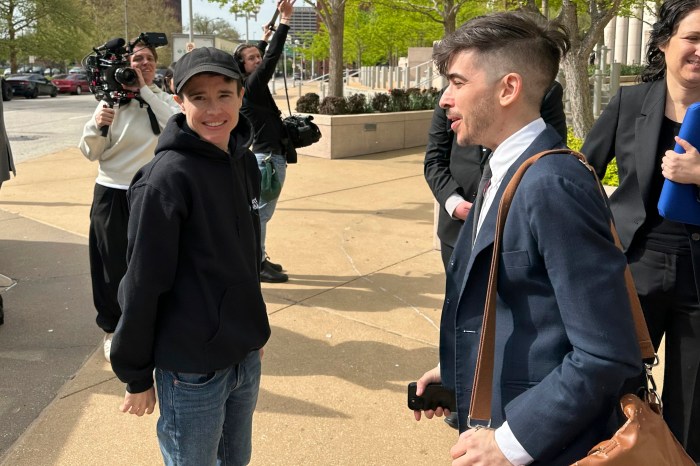Reversing decisions by a federal district court judge and a magistrate judge, a panel of the US Fourth Circuit Court of Appeals has acquited a gay man convicted of disorderly conduct for groping an undercover federal ranger in North Carolina in 2009. The 2-1 decision came in an appeal brought by Joe Lanning, who was targeted in a vice sting operation at the Sleepy Gap Overlook of the Blue Ridge Parkway near Asheville.
Writing for the appeals panel, Judge James A. Wynn, Jr., found that “no rational trier of fact could find beyond a reasonable doubt” that Lanning’s “brief touch of the ranger’s crotch, done in response to the ranger’s deliberate attempt to convince Defendant that he would have sex with him, was ‘physically threatening or menacing’ or ‘likely to inflict injury or incite an immediate breach of the peace.’” Under the circumstances, Lanning’s conduct was not “obscene,” Wynn found.
Man snared by park ranger’s encouragement avoids a 15-day jail sentence
The US Park Service and Forest Service, claiming to have received complaints from members of the public that Sleepy Gap had become a locus of gay male sex activity, undertook a joint operation “designed to enable officers to identify and arrest men who were using the area for sexual solicitation or activity with other men.” Joe Darling, a 200-pound, 33-year-old park ranger, was assigned to undercover duty and was out looking to find gay men to arrest. He spotted Lanning, a 62-year-old retiree, on a trail near the overlook, and set out to provoke him into conduct that would provide the basis for an arrest.
“As Darling walked past Defendant, Defendant grabbed his own groin and kept walking,” Wynn wrote in his summary of the trial record. “Darling said hello and also kept walking. Five or ten minutes later, after walking around in the woods and talking to a few other people, Darling went looking for Defendant and found him standing by himself on an unofficial trail. Darling engaged Defendant in a casual conversation about the weather for several minutes. Darling then commented that Asheville was ‘an open community,’ accepting of a homosexual lifestyle. Defendant responded that he ‘wanted to be F’ed.’ Darling replied ‘okay or yes, or some to that affirmative,’ and ‘gave Lanning every reason to believe that Darling was good to go.’ At that point, Defendant — who was facing Darling and standing approximately three to five feet away from him — turned around, took one or two steps backward towards Darling, and, with his left hand, reached back and ‘very briefly’ touched Darling’s fully-clothed crotch. Darling described the touch as ‘a fairly firm grasp’ that lasted ‘very briefly,’” until he could get out the words: “Police officer, you’re under arrest.”
Lanning was charged with “disorderly conduct” under an Interior Department regulation that states that a person is guilty of “disorderly conduct” if he “uses language, an utterance, or gesture, or engages in a display or act that is obscene, physically threatening or menacing, or done in a manner that is likely to inflict injury or incite an immediate breach of the peace.”
District Judge Martin K. Reidiner upheld a magistrate judge’s 15-day prison sentence and $500 fine for Lanning, but did not allow the magistrate to also bar him from visiting any federal parks for two years. Lanning appealed to the Fourth Circuit, claiming the government failed to meet its burden of proving beyond a reasonable doubt that he had engaged in disorderly conduct.
On the question of whether Lanning’s conduct was “obscene,” the appeals court found that “under these circumstances, we cannot conclude that anyone ‘of ordinary intelligence’ would understand that such conduct is ‘morally repulsive’ or ‘offensively or grossly indecent’ or ‘lewd.’” The term, it concluded, was “unconstitutionally vague as applied in this case.”
“The real risk,” Wynn wrote, is “that the provision may be ‘arbitrarily and discriminatorily enforced,’” because this sting operation “specifically targeted gay men. Perhaps not surprisingly, then, the all-male undercover rangers arrested only men on the basis of disorderly homosexual conduct. The impetus for the sting operation: citizen complaints. Darling testified that ‘the public was concerned’ about ‘male on male activity in that area that was targeted.’ Darling testified that every single one of the citizen complaints had been about homosexuals. It may be that gay men engage more frequently in sexual activity in the Blue Ridge Parkway and therefore generate more citizen complaints. Yet it is entirely plausible that the public in and around the Blue Ridge Parkway subjectively finds homosexual conduct, even relatively innocuous conduct such as that at issue here, particularly ‘morally repulsive’ and ‘grossly indecent,’ and therefore complains. If the public is, by contrast, not similarly troubled by a woman propositioning her boyfriend for sex and then briefly touching his clothed crotch, there would exist no citizen complaints and no related sting, even for otherwise identical heterosexual conduct. Simply enforcing the disorderly conduct regulation on the basis of citizen complaints therefore presents a real threat of anti-gay discrimination.”
On the question of whether Lanning’s behavior was “physically threatening or menacing,” Wynn wrote, “it defies logic that Darling was shocked by Defendant’s touch when it was, in fact, precisely what Darling had been ‘stringing Defendant along’ to do — to cross a certain line” so that he could arrest him. “Facts matter,” the judge wrote. “Had Defendant and Darling engaged in flirtatious conversation that did not involve an agreement to have sex, a reasonable person might well have felt physically threatened or menaced” by Lanning’s actions. “Likewise, had Defendant pinned Darling down and attempted to remove Darling’s clothing, a reasonable person, even one who had consented to sex, might well have felt physically threatened or menaced by that conduct.”
In a similar vein, the court rejected the notion that Lanning’s conduct was “done in a manner that is likely to inflict injury or incite an immediate breach of the peace.”
Wynn and Circuit Judge Henry Franklin Floyd, who joined in his opinion, were both appointed by President Barack Obama. The dissenter, Allyson Kay Duncan, appointed by George W. Bush, accused the majority of failing to accord “the level of deference to the magistrate judge’s findings of fact required by our standard of review. I believe that a rational trier of fact could have found a physical touching such as this implying an immediate intent to engage in sexual activity in public both obscene and physically threatening or menacing.”

































